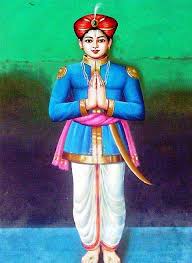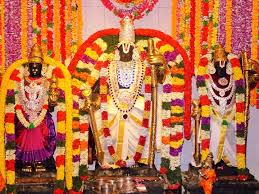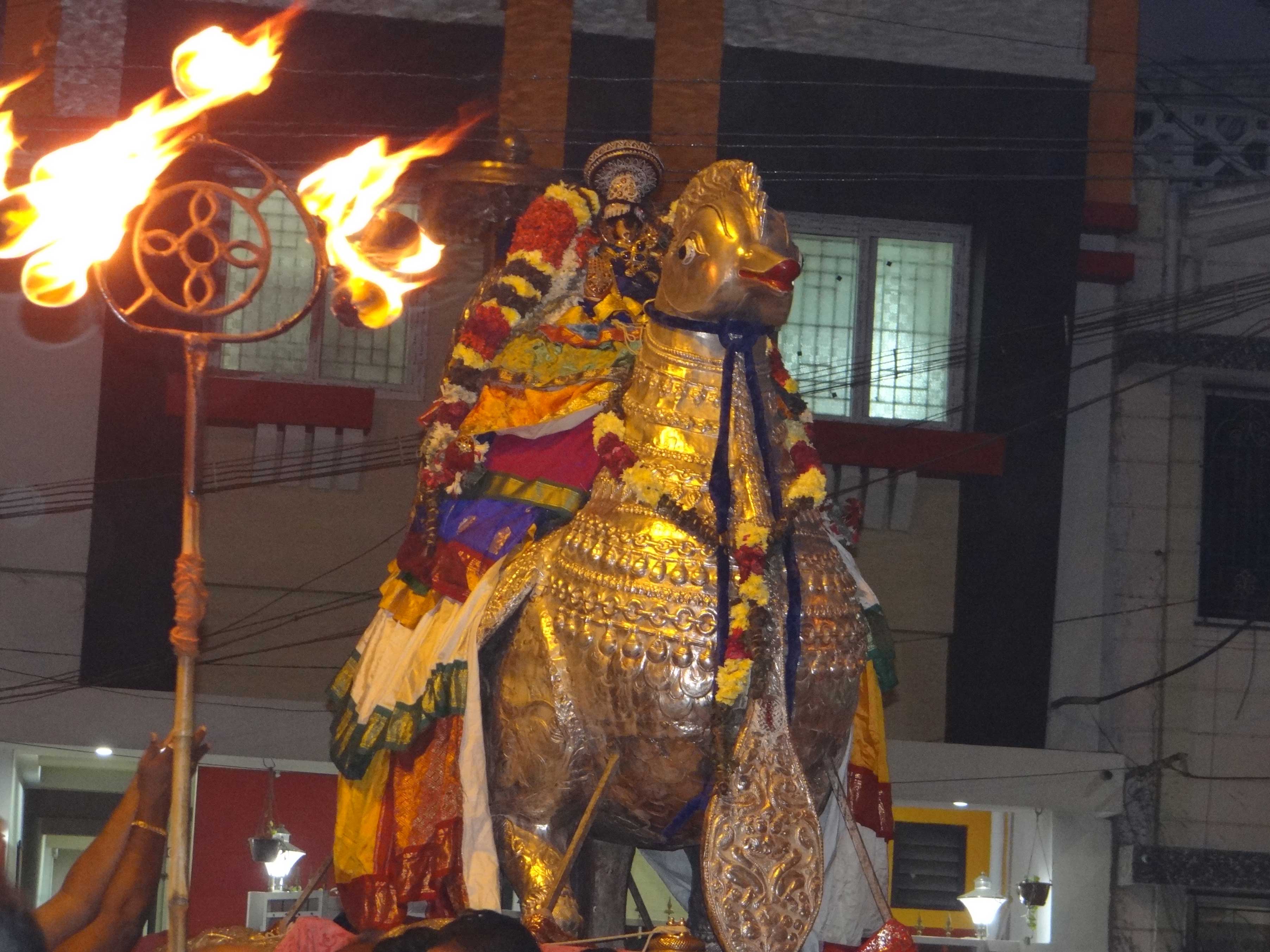 HOME
AZHVARS
ACHARYA
VEDIC SCIENCE
ABOUT US
HOME
AZHVARS
ACHARYA
VEDIC SCIENCE
ABOUT US
 |
|
|---|---|
| KULASHEKHARA AZHVAR | |
| MONTH: | Maasee Punar Poosam |
| BIRTHPLACE: | Thiruvanchikulam. |
| WORKS: | Perumal Thirumozhi, 105 verses. |
| AVATAR OF: | Kaustubha (Vishnu's jewel embedded in his necklace). |
 |
|
Chera Nadu is otherwise called as "Malai Nadu", which is rich in wealth and is surrounded
by big beautiful mountains and rivers. In this Chera Nadu, lots of Elephants are found as
cows found in Thondai Nadu. All the people found in this empire are said to be great warriors.
Not only in war, but also in education and the way they led the country and their life. Chera Nadu
was ruled by Chera Kings, who ruled for more decades. They led the empire in peace and made the life of the people happy.
In that generation, a king by named "Thidaviradhan", ruled the Chera Empire, who had a great bhakti towards Sriman Narayanan.
He gave proper respect and gave lots of valuable things to Vishnu bhaktas. As the kind of life by the king, as the Hamsam of
Sri Vishnu's Sri Kausthubham (the gem on the chest of Lord Vishnu), a baby was born in Prabhava year, Maasi month, Sukla Dvadesi,
friday in Punarpoosa Natshatram (Star). Since, the child was born as the result of Vishnu bhakti of the king, it look very bright and beautiful.

As the birth of child, the entire empire celebrated his birth and after 10 days, the child was kept the name "Kulasekaran". He was not only taught with the studies, but also with various was teachings like horse riding, Elephant ride, practiced the sword fight, Gadhai and Chariot riding. He was very well taught with studies and also with various fighting aspects for war.
 (Birth Place - Thiruvanjikkulam)
(Birth Place - Thiruvanjikkulam)
After attaining the proper age, he was given the throne and led the Chera Nadu.
He also gave the proper respect to the Vishnu bhaktas and made the people very happy.
He fought with great speed in the war and defeated all the opposing kings. On seeing this,
the Chozha kings and Pandiya kings got jealous on him and tried to defeat him in the war.
But, Kulasekarar with his mighty soldiers and army defeated them and extended his empire towards Chozha Nadu.
Kulasekara Alwar On seeing the greatness and the masculine character of Kulasekarar,
Pandiyan king married her daughter to Kulasekarar. After getting married,
he led his life with his wife and along with the war and capturing the various empires.
 (King Kulashekara)
(King Kulashekara)
But the life of Kulasekarar went on as this and one fine day,
he got irritated for his leading of life and felt sorry for the lives he had killed in the war.
This made him to think about Sriman Narayanan and thought that he should lead his life by being
useful to others and at the same time he should spread the Vishnu Bhakti in the midst of human life.
Kulasekarar had a great attention towards hearing the purana stories.
He called up lots of old persons and heared lots of old stories and the thathuvam in it.
He gave lots of prizes to the old person. Likewise, one day an old yogi was called to say a story in the puranas.
At one time in his court a religious scholar was giving a discourse on Ramayana and the predicament that Rama faced in fighting Ravana.
KulasEkara got perturbed and asked his army general to get his army ready to be sent to help Rama. Such was his devotion to Rama.
He had to be consoled later by the scholar that all was well with Rama and that he prevailed in the war.


Because of his great bhakti, he did lots of Dhaanams to Vishnu bhaktas.
Due to this many ministers were angry on all Vishnu bhaktas and this anger turned towards them.
Some of his ministers, stealed the ornaments of the Perumal.
The next day, Kulasekarar was surprised to see some of the ornaments being stolen.
He wanted to know who had done that, knowing the situation, the ministers complained that
the ornaments are stolen only by the Vishnu Bhaktas. But, kulasekarar denied that by saying
it can't be done by any of Vishnu bhaktas and having a great faith of them, Kulasekarar asked
some of ministers to bring a vessel in which lots of poisonous snakes are put.
His ministers also did the same thing as said by their king.
They came along with a vessel in which lots of poisonous snakes are found.
Kulasekarar said to all of his ministers in the midst of the palace,
that he is going to insert his hand into the vessel.
If the ornaments are stolen by the Vishnu Bhaktas as said by his ministers,
the snakes will bite him, but if not, they will not bite him.
By telling this, he inserted his hand into the vessel,
but since the ornaments are not stolen by the bhaktas the snakes didn't bit him.
He took his hand without even a single bite. The entire minister was ashamed of their act
towards the Vishnu bhaktas and they asked sorry to kulasekarar for what they have done.
This acts of Kulasekarar explains how dedicated he is towards Vaishnavism and to the Vishnu bhaktas.

Perumal thirumozhi
Being a scholar in thamizh, Kulasekara azhwar wrote 105 pasurams in praise of the deities at srirangam,
thirumalai (thiruppathi), thiruviththuvakkodu, Thirukkannapuram, thiruccitrakudam, ayodhdhi, and also on rama and krishna.
All the Pasurams have been compiled into 10 decads. It is important to point out here that
it was the Common practice among azhwars to do thematic 10 verses on each deity, episode, or shrine.
Let us examine what each decad covers. In the first three decads (31 pasurams in all) the
Azhwar agonizes about when he would be able to visit srirangam and see lord ranganatha
Whose feet are washed by the river cauvery.. He wants to do service to the lord and his
Devotees. He recognizes that the real duty of the lord’s servitors is to shun worldly pleasures.
He wants to be a devotee to the Lord in all seven births. In Srirangam he built a mantapam and did
Renovation work in the 3rd enclosure surrounding the temple. It now bears kulasekara’s name.
In the fourth decad he longs to be associated with thiruvengadam (Thirumalai/Thiruppathi) in
Any form—be it animate or inanimate in the sacred hills. He mentions that he does not want his
Royalty, wealth, and even the opportunity to rule the heavens if given. He would rather want to be
Born as the fish in the temple pond or the bird (a crane for instance) that circles there. The desire
To be born as a crane is indicative of his earnestness to catch a glimpse of the Lord just as the
Crane would eagerly wait for the fish to swim by. He would want to be born as a flower bush,
The hilltop, and even the flagpole at the entrance to the temple. The wild river, the path leading to
The temple and even the steps at the entrance to the temple are his choices. Let us examine one
Pasuram here.
Sediyaya Valvinaigal Tirkkum Thirumale!
Nediyone! Vengadava! Ninkoyi Linvasal
Adiyarum Vanavaarum Arambaiyarum Kidandhiyangum
Padiyayk Kidandhun Pavalavay Kanbene!
In this pasuram he appeals to Lord venkateswara of Thiruppathi who quells the miseries of his
Devotees that he would like to be a stone step at the entrance to His shrine which will be stepped
On by the devotees, and celestials who come to visit Him. That way he could watch the Lord
Forever. To this day the step that leads to the sanctum sanctorum of vaishnavaite shrines is
Known as “kulasekara thiruppadi” (kulasekara Sacred Step) in recognition of his intense
Desire to be born as the stone step.
In the fifth decad he talks of the glory of the divya desam vittuvakkodu, located in palakkadu
District (in kerala). There are so many similes in this decad. He says he considers the Lord as
His mother and himself as the Lord’s child. Even if the mother were to desert the child, the child
Would cry and go to the mother. A patient would continue to see his medicine man although the
Medicine man may use harsh techniques (using knife) to cure him. Likewise even if God
Subjected him to undergo miseries, he would continue to visit the Lord in order to get
Deliverance. Another pasuram talks about a bird which circles a ship would fly away to find the
Shore but not finding it would come back to the ship’s tall pole and sail.
The azhwar finds himself in the same situation as the bird and that he would always surrender unto the lord.
In the sixth decad he describes the despair/disappointment experienced by the gopis at gokulam
When Krishna does not turn up as promised. He expresses the separation pangs experienced by
The gopis in several pasurams. One pasuram resorts to a complaint against Krishna by the
Gopis. The gopis tell Krishna that they are not gullible enough to be taken by the glib talk by
Him. It is a mock complaint telling Krishna not to come to see them because he utters deceitful
Words to attract them but does not follow through with his promises.
The seventh decad is very heart wrenching. It deals with devaki’s misfortune with respect to her
Not being able to fondle and enjoy her infant son Krishna. The azhwar experiences her agony
Vicariously. Devaki missed all the childhood pranks of Krishna. He even pleads with the lord on
Behalf of devaki to reenact such childhood activities to satisfy his birth mother. In addition he
Mentions that when baby Krishna was asked “where is father?” He turned his eyes towards
Nandagopan (foster father) while that privilege was not available to vasudeva (real father). Let
Us look at one specific pasuram here which describes yasodha’s pleasure.
Muzhudhum Vennaiyalaindu Thottunnum Mgizhilanj ciruttamaraik Kaiyum
Ezhilkol Tambu Kondadippadhar Kelgum Nilaiyum Ventayir Toyndha Sevvayum
Azhugaiyum Anji Nokkuman Nokkum Anikol Senjciru Vay Nelippadhuvum
Tozhugaiyum Ivai Kanda Asodhai Tollai Inbattirudhi Kandale
Meaning: Yasodha witnessed all the mischievous deeds of baby Krishna such as: eating butter
With the lotus-bud-like tender little hands stirring in the pots of butter; laughing derisively upon
Being whipped by the soft rope; walking around with white curd spilling from the red mouth;
Mock crying and the fake look of fear; the curving of the red little mouth; and the appearance in
Front of his mother with folded hands seeking mercy.
These mischievous deeds were the divine child’s way of teasing yasodha. These were the very
Same activities that would have given devaki (the real mother) immense pleasure which she was
denied since the infant was transported in the middle of night soon after birth to gokulam. The
Azhwar experiences such agony of devaki himself.
The eighth, ninth, and tenth decads deal with Rama, the favorite deity of kulasekara. The 10
Songs in the eighth decad constitute a lullaby to baby Rama. All these song were dedicated to
The lord at thirukkannapuram. Let us read one such lullaby.
Mannupugazh Kausalaithan Manivayiru Vayttavane!
Tennilangaik Konmudigal Sinduvittay! Semponser
Kanninanma Madhilpudaisuzh Kanapuratten Karumaniye!
Ennudaiya Innamude! Iragavane! Talelo.
In the above pasuram the azhwar sings a lullaby to baby Rama placing himself in the position
Of a mother. He sings: Oh, Rama! The darling son of Kausalya you beheaded the king of lanka.
You are now occupying the shrine here at thirukkannapuram which is surrounded by the
Golden ramparts. You are my nectar. Please fall into sleep gently.
In the ninth decad he assumes the role of Dasaratha (Rama’s father) and agonizes over
Kaikeyi’s demand that Rama should be exiled for 14 years, Rama having to sleep on the stone
Platform in the forest, and curses himself over such a predicament that befell Rama. In the tenth
Decad he describes the whole episode of Ramayana while observing Lord Govindaraja of
Thirucitrakudam (Cidambaram). Although Lord Govindaraja is in the recumbent position, the
Azhwar sees the lord as Rama seated on the throne or in the standing Posture there.
Kulasekara azhwar was also well-versed in Sanskrit and accordingly sang 53 slokhams in Sanskrit on Krishna.
It was in praise of Krishna titled Mukunda Mala (garland for Krishna). In the 52nd slokham he
Signs it as a bee at the lotus feet of the lotus-eyed lord. In the final slokham he declares the benefit
(phalasruti) of reciting all the slokhams, viz., the eradication of all sins and the attainment of the
Lord’s abode. He is revered as perumal and his pasurams (105 of them) are known as perumal Thirumozhi in recognition of his exalted status.


